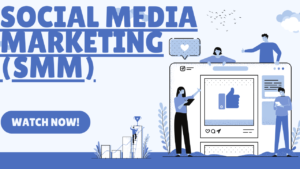SMM

In the dynamic landscape of digital marketing, Social Media Marketing (SMM) has emerged as a game-changer for businesses seeking to connect with their audience, build brand awareness, and drive engagement. With billions of users actively engaging on platforms like Facebook, Instagram, Twitter, LinkedIn, and TikTok, SMM offers unparalleled opportunities for businesses to reach and interact with their target audience. In this comprehensive guide, we’ll explore the importance of SMM, effective strategies for leveraging social platforms, and how it can benefit your business.
Introduction to Social Media Marketing (SMM):
Social media has revolutionized the way businesses communicate and engage with their audience. What started as a platform for connecting friends and family has evolved into a powerful marketing tool for businesses of all sizes and industries. SMM allows businesses to establish a presence on popular social platforms, share content, interact with followers, and ultimately drive valuable outcomes such as website traffic, leads, and sales.
Importance of Social Media Marketing (SMM):
- Audience Reach: With billions of active users on social media platforms, SMM provides businesses with unprecedented access to a global audience. Whether your target audience is local or international, social media allows you to reach and engage with potential customers wherever they are.
- Brand Awareness: Social media is an effective channel for building brand awareness and recognition. By consistently sharing valuable content and engaging with your audience, you can increase visibility and exposure for your brand, making it more recognizable and memorable among your target audience.
- Customer Engagement: Social media platforms are inherently interactive, allowing businesses to engage directly with their audience in real-time. Through likes, comments, shares, and direct messages, businesses can foster meaningful conversations, address customer inquiries, and build relationships that drive loyalty and advocacy.
Effective Strategies for Social Media Marketing (SMM):
- Know Your Audience: Understanding your target audience is essential for creating effective SMM campaigns. Conduct thorough audience research to identify their demographics, interests, behaviors, and pain points. Use this information to tailor your content and messaging to resonate with your audience and address their needs effectively.
- Create Engaging Content: Content is the heart of any successful SMM strategy. Create high-quality, engaging content that captures the attention of your audience and encourages them to interact with your brand. Experiment with different formats such as videos, images, polls, contests, and infographics to keep your audience entertained and informed.
- Consistent Branding: Maintain a consistent brand identity across all your social media channels. Use consistent brand colors, logos, fonts, and messaging to reinforce your brand identity and make it easily recognizable to your audience. Consistent branding helps build trust and credibility with your audience, making it more likely that they’ll engage with your content and follow your brand.
- Engage with Your Audience: Social media is a two-way street. Encourage conversations by responding to comments, messages, and mentions promptly. Show your audience that you value their input and feedback by actively engaging with them and participating in relevant discussions. By fostering a sense of community around your brand, you can build stronger relationships with your audience and increase brand loyalty.
- Use Data to Inform Your Strategy: Leverage social media analytics tools to track key performance indicators (KPIs) such as engagement rate, reach, click-through rate, and conversion rate. Use this data to measure the effectiveness of your SMM efforts, identify areas for improvement, and refine your strategy over time. Regularly monitor and analyze performance metrics to ensure that your SMM campaigns are driving meaningful results for your business.
FAQs About Social Media Marketing (SMM):
Q: Which social media platforms should I focus on for my business? A: The best social media platforms for your business will depend on your target audience, industry, and marketing objectives. Research your audience demographics and preferences to determine which platforms they frequent the most, and focus your efforts on those platforms.
Q: How can I measure the effectiveness of my SMM efforts? A: Use social media analytics tools to track key performance indicators (KPIs) such as engagement rate, reach, click-through rate, and conversion rate. Monitor these metrics regularly to gauge the effectiveness of your campaigns and identify areas for improvement.
Q: What role does paid advertising play in SMM? A: Paid advertising can complement your organic SMM efforts by allowing you to reach a wider audience and drive targeted traffic to your website or landing pages. Experiment with different ad formats such as sponsored posts, carousel ads, and video ads to see which resonates best with your audience.
Audience Reach:
Audience reach refers to the number of people who are exposed to your content or message. The broader your reach, the greater your potential for attracting new visitors, followers, and customers. Increasing your audience reach allows you to connect with a larger and more diverse audience, driving awareness and engagement for your brand or business.

Effective Strategies for Maximizing Audience Reach:
- Identify Your Target Audience: Before you can expand your audience reach, you need to understand who your target audience is. Conduct thorough market research to identify your ideal customers’ demographics, interests, behaviors, and pain points. Use this information to create buyer personas that represent your target audience segments, and tailor your content and messaging to resonate with their needs and preferences.
- Create High-Quality Content: Content is the cornerstone of any successful audience reach strategy. Create high-quality, valuable content that provides solutions to your audience’s problems, answers their questions, or entertains and inspires them. Whether it’s blog posts, videos, infographics, podcasts, or social media updates, focus on creating content that adds genuine value and resonates with your target audience.
- Optimize for Search Engines: Search Engine Optimization (SEO) plays a crucial role in expanding your audience reach. Optimize your website and content for relevant keywords and phrases that your target audience is likely to search for. Use keyword research tools to identify high-volume, low-competition keywords, and incorporate them strategically into your content, headings, meta tags, and URLs to improve your visibility in search engine results pages (SERPs).
- Utilize Social Media: Social media platforms are powerful tools for expanding your audience reach and driving traffic to your website or content. Identify the social media platforms where your target audience is most active, and establish a presence on those platforms. Share your content regularly, engage with your audience, and participate in relevant conversations to increase your visibility and attract new followers and fans.
- Collaborate with Influencers: Influencer marketing can help you reach a wider audience and build credibility and trust for your brand or business. Identify influencers in your niche or industry who have a large and engaged following, and collaborate with them to promote your products, services, or content to their audience. Influencer partnerships can help you tap into new audiences and expand your reach in a more authentic and impactful way.

FAQs About Audience Reach:
Q: How long does it take to see results from audience reach strategies? A: The timeline for seeing results from audience reach strategies can vary depending on factors such as your industry, target audience, and the specific strategies you’re implementing. While some tactics may yield immediate results, others may take time to gain traction and produce measurable outcomes. It’s important to be patient and persistent in your efforts, continuously monitoring performance metrics and making adjustments as needed.
Q: How can I measure the effectiveness of my audience reach efforts? A: Use analytics tools to track key performance indicators (KPIs) such as website traffic, engagement metrics, conversion rates, and social media followers. Monitor these metrics regularly to gauge the effectiveness of your audience reach strategies and identify areas for improvement. Additionally, conduct surveys or gather feedback from your audience to gain insights into their preferences and behaviors.
Q: What role does content quality play in audience reach? A: Content quality is essential for attracting and retaining your audience’s attention and driving engagement. High-quality content that provides value, solves problems, or entertains your audience is more likely to be shared, recommended, and amplified, leading to increased audience reach and visibility for your brand or business.
n conclusion, maximizing audience reach is essential for expanding your online presence and driving traffic, engagement, and conversions for your brand or business. By identifying your target audience, creating high-quality content, optimizing for search engines, leveraging social media, and collaborating with influencers, you can reach new audiences and connect with them in meaningful ways. Remember to regularly monitor performance metrics, gather feedback from your audience, and adjust your strategies accordingly to ensure that you’re continuously expanding your audience reach and driving meaningful results for your business.
Conclusion:
In conclusion, Social Media Marketing (SMM) offers businesses unparalleled opportunities to connect with their audience, build brand awareness, and drive engagement. By understanding your audience, creating engaging content, maintaining consistent branding, and actively engaging with your audience, you can leverage the power of social platforms to achieve your marketing goals. Remember to regularly monitor and measure the effectiveness of your SMM efforts, and adjust your strategies accordingly to stay ahead of the competition and maximize your ROI. With the right approach,SMM can be a valuable asset for growing your business and achieving long-term success in the digital age.

